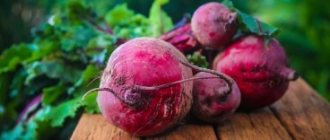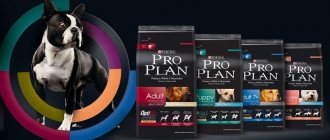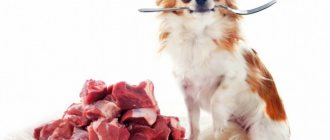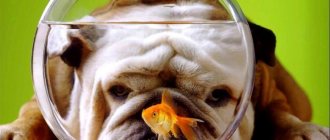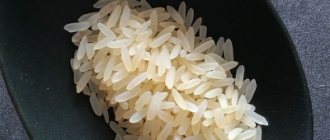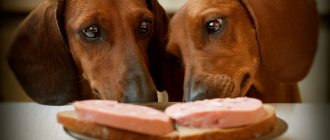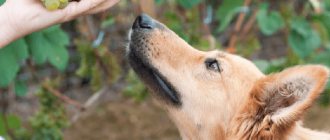Chihuahuas are small dogs native to Mexico with a complicated history of origin.
A Chihuahua owner who decides to feed his pet natural food is faced with the difficult task of choosing the ideal diet for the dog.
And, of course, one of the main questions that worries owners is what foods can be given to a Chihuahua and which cannot?
After all, sometimes you really want to treat your pet to something tasty, but you are not sure whether the tasty morsel will be harmful to the pet.
So what foods can be given to a Chihuahua, and what should be excluded from the diet of these dogs once and for all?
In what form, what kind, can it be added to food?
The chicken is fed after heat treatment; raw meat may contain salmonellosis and other harmful bacteria. Chicken bones, which can injure the esophagus, are prohibited for dogs; skin and fatty rich broth are of no benefit.
Take the Attention Test! Find 10 differences! (click right here!)
Find the answer Are you bothered by some problem or question? Enter “Breed” or “Name of the problem” into the form, press Enter and you will find out everything about the issue that interests you.
The sirloin is cut into small pieces and mixed with cereals or vegetables. Feeding your pet dry food does not require the addition of chicken.
If it gets bad
If, after eating such a dish, the dog begins to have diarrhea and vomiting, which are accompanied by unsatisfactory health, then it is recommended to abandon the product. These symptoms may indicate a malfunction of the pancreas.
In this case, you need to transfer the animal to a gentle diet with a minimum amount of fatty, salty and sweet foods. It is necessary to completely avoid raw meat. It is important to take your dog to the vet immediately . In such cases, enzyme preparations are prescribed to improve the functioning of the pancreas.
Can puppies and pregnant women eat chicken?
Chicken meat can be fed to puppies and pregnant females if its digestibility is normal.
A puppy’s transition to solid food usually begins with chicken meat; if there are no problems with digestion, chickens can be safely included in the diet. It is important to consistently introduce the puppy to other types of meat, offal, and fish.
Food for pregnant bitches should be nutritious and balanced. Poultry protein, having energy value, is well absorbed and supplies the body with the necessary amino acids. With natural feeding, chicken, along with other types of meat, is necessarily included in the menu for females expecting offspring.
Nutrition for a nursing bitch
In the first week after giving birth, a pregnant mother is given tea with milk and honey to enhance lactation. Feeding, as before, is carried out 4 - 5 times a day. Dried apricots and prunes are especially useful during this period. After weaning the puppies, the diet is slowly reduced and returned to the usual amount of food.
How to properly feed your dog chicken
The main part of the bird carcass consists of cartilaginous bones, meat and offal.
Dogs are allowed to feed:
- meat;
- heads;
- neck;
- stomachs and hearts;
- liver;
- frame (back);
- paws and wings.
It is prohibited to give:
- tubular bones;
- boiled bones.
Chicken meat is nutritious, tender, full of protein, containing few harmful fats, suitable for puppies and adult dogs to eat, safe for consumption - if it does not provoke allergies, it can be fed raw or boiled.
Bird heads are considered a healthy by-product due to their brain content. However, it is not advisable to feed them to small individuals with weak jaw apparatus. Large and medium-sized dogs with strong jaws can easily chew through soft head bones. Before serving, be sure to remove the beak; this part is not digested by the dog’s stomach, causing a risk of damage to the esophagus.
The necks will serve as a tasty treat for your pet; they are fed to representatives of small breeds and six-month-old puppies. The necks are not boiled, they do not contain dangerous bones, but for small dogs the bones are first softened by beating with a special hammer.
The ventricles and hearts are boneless, contain valuable microelements, and are safely served to all dogs who do not suffer from allergies. These by-products are fed raw or boiled and combined with vegetables and cereal porridges.
Liver is rich in protein, vitamins A and B. It is given raw or boiled, no more than 2 times a week, since, acting as a filter, it concentrates harmful substances that enter the bird’s body from feed; excessive consumption of liver leads to diarrhea . It is better to consume offal from domestic chickens raised without the use of hormonal drugs.
The backs are given raw and only to large individuals who can chew and carefully gnaw the bones.
Paws and wings are rich in amino acids and collagen, necessary for the healthy state of the dog’s musculoskeletal system. Parts of the carcass are given raw or they are used to make rich jellied meat. First, be sure to remove the tubular knuckles from these bird parts and cut out the claws from the paws.
It is forbidden to give dogs any boiled or tubular bones; under the influence of the dog’s teeth, they crack into sharp pieces like glass; if such fragments get into the esophagus, they injure the stomach and intestines, which leads to bad consequences for the pet.
It is not recommended to offer chicken skin; other than fat, it has no health benefits.
The owner needs to try to teach the dog to chew food, at first he will have to offer to feed from his hand, holding a piece, promoting gradual eating, so the animal will begin to chew the food rather than swallow it whole.
Bone-containing by-products should not be boiled; they should be offered with caution to puppies and small breeds who have difficulty chewing.
Many dog breeders refuse to offer chicken paws, wings, heads, and backs to their dogs, considering them potentially dangerous due to the presence of bones. For a puppy or small dog, it may be better to avoid such treats; if the dog chews solid food thoroughly, then parts of the carcass with soft bones do not pose a danger. Feeding each dog must be approached individually.
https://dog-care.ru/zdorove/pitanie/mozhno-li-chihuahua-kuritsu.html
Features of feeding with prepared food
As you can see, the care and maintenance of Chihuahuas have special specifics due to the demanding diet of these babies. However, many owners get rid of this “headache” by purchasing dry food for their Chihuahua.
This food does not require cooking, so you can save time. Dry food contains proteins, fats and carbohydrates in the required proportions; in addition, super premium food is always supplemented with microelements that have a good effect on the dog’s well-being, the condition of its coat, etc.
Dry food can be fed to both adult dogs and puppies - you just need to choose the right type. They are easy to take on the road (an excellent solution to the question of what you can feed your dog on the road). One package will be enough for the little one for many days.
It is important to use premium and super premium food. They are not cheap, but the third type, that is, the cheap “economy” one, is harmful. It is better to feed your Chihuahua expensive but high-quality food than to spend much more money on its treatment later. For animals suffering from any food allergies, there are hypoallergenic foods.
Related article: When and how to properly breed a Chihuahua
If you are in doubt about the best way to feed your pet, you can consult your veterinarian.
Difference between cooked and raw chicken for dogs
For all dogs who do not suffer from allergic symptoms, chicken and a non-concentrated broth based on it are suitable for food variety. The pet will receive more nutrients from a raw product, but there is a risk of infection with salmonella or other bacterial infection, so most owners feed the bird only after heat treatment.
Uncooked bird bones (not tubular) are soft and easily processed by the stomach; boiled bones are dangerous to the health of the animal; when cooked, they become fragile, and when chewed, they crumble into sharp particles that can injure the walls of the esophagus. The bone parts of the carcass are not boiled, but are doused with boiling water against bacteria.
What can replace chicken?
An alternative is turkey, it is low in calories, rich in vitamins A, E, potassium, sodium, magnesium, iron, has little fat, and is easily digestible. The process of raising this bird is rarely accompanied by the use of hormones and antibiotics; most dog lovers prefer turkey meat when creating a menu for their pet.
Usually, with natural feeding, the basis of the diet is beef, rich in nutrients, but it does not contain all the necessary microelements.
Other alternative meats include:
- mutton;
- horsemeat;
- venison;
- pork;
- rabbit meat.
Lamb is valued for its high potassium and magnesium content and low cholesterol.
Horsemeat is easily digestible, rarely causes an allergic condition, but is of little nutritional value for active dogs.
Venison is valued for its usefulness and uniqueness, has a beneficial effect on cardiac activity and the functioning of the gastrointestinal tract, and is considered a delicacy; not every owner will be able to pamper a pet with such a treat if he is not a hunter.
There is a lot of controversy about pork; many owners prefer to find an alternative to it or only serve it boiled.
Rabbit meat is a healthy product, but is contraindicated for animals with kidney and biliary tract diseases.
It is important for the animal to organize a balanced diet, including dairy products, eggs, fish, cereals, fruits, vegetables, and herbs.
Calories at a Glance
The amount of calories consumed affects physical activity (energy) and the proper functioning of the dog's body. Calorie consumption is as follows:
- A growing puppy under the age of 1 year, healthy and active, requires about 50 kcal per 1 kg of body weight per day.
- An adult Chihuahua aged 1 to 7 years, healthy and receiving proper exercise, requires about 35-40 kcal per 1 kg of body weight per day.
- At an older age (8 years and above), with a sedentary lifestyle and possible health problems, only 30 kcal per 1 kg of weight per day is required.
The values given may vary by up to 20% depending on the activity level, metabolism and any existing health problems of the individual.
What are the benefits of chicken for dogs?
Chicken is considered a dietary product with a high energy component, containing easily digestible protein, amino acids, vitamin B, phosphorus, potassium, calcium, magnesium and other microelements.
Chicken by-products are also considered useful:
- stomachs are valued for their fiber, which improves digestion and intestinal function;
- the liver is rich in protein and vitamin A, which has a beneficial effect on skin and vision;
- paws contain collagen, which maintains the normal state of the musculoskeletal system;
- necks have soft bones that promote the development of dog jaws.
Only a fresh, high-quality product brings benefits.
What's not allowed?
The following foods should never be given to your pet:
- chocolate;
- grapes or raisins;
- avocado;
- sugar;
- cookies, candies and other sweets;
- baked goods;
- smoked meats;
- pickles;
- sausages;
- pork;
- mayonnaise and products with it, for example, salads;
- spices;
- spicy dishes;
- ketchup;
- carbonated drinks;
- alcohol.
CAREFULLY!
You should not give your dog tubular bones, as well as chicken feet or any boiled bones in general, as this can lead to perforation of the esophagus or intestines.
Why is chicken harmful to your pet?
The harm lies in individual intolerance to the product; low-quality or expired products also cause damage to health. It is advisable to use poultry raised in natural village conditions or buy chicken from sellers who are responsible for the quality of their product. Some producers on poultry farms add hormonal substances and antibiotics to feed; eating chickens filled with such drugs will harm the development of puppies and the health of adult dogs. “Hormonal” food provokes early puberty and improper skeletal formation in dogs, causing digestive disorders and allergic irritation.
Fatty chicken broth is harmful to the pancreas, liver and gastrointestinal tract of the animal.
Boiled and tubular chicken bones are dangerous; when they crumble into fragments, they damage the esophagus, leading to serious complications, including death.
Allergy to chicken in a dog
Chickens, along with other foods, sometimes cause an allergic reaction. Chicken protein intolerance is often found in dogs; some breeds (dachshunds, Labradors, bulldogs, etc.) are predisposed to food intolerance. It is necessary to responsibly plan the diet of sensitive individuals.
Symptoms:
- skin itching;
- rash;
- discharge;
- edema;
- unpleasant odor;
- digestive disorder.
Because of the itching, the dog begins to scratch the skin, it may peel, redness, papules form near the anus, in the abdomen, armpits, on the face, often the irritated areas become wet and covered with crusts. Discharge appears from the eyes, ears, nose, and swelling occurs. The fur begins to smell bad and diarrhea appears.
The allergic condition has an individual character, one dog eats a certain food in large quantities, and another will have a negative reaction.
The allergen is determined by adjusting the feeding; if chicken is suspected, it is completely removed from the diet and the dog’s condition is monitored. The main method of treating food allergies is diet. In some cases, the veterinarian recommends switching the dog to special food.
Usually, after eliminating the allergen, the symptoms quickly go away, but sometimes drug intervention is required to prevent complications; antihistamines, antipruritic ointments and antiseptics, diuretics that help eliminate swelling are used, and immunomodulatory medications are additionally prescribed by the veterinarian. Medicines are selected individually; effective treatment of the dog will only be carried out by a veterinarian.
Who is prohibited?
You should not give cheese to dogs suffering from any liver problems : hepatitis, liver pathologies (acute pancreatitis), toxic liver degeneration, cirrhosis, ascites. This delicacy is also contraindicated if the dog is obese, has problems with the pancreas, or has low mobility.
If the pet is weakened, has recently undergone surgery or a trip, or has temporary digestive problems, then there is no need to give cheese just yet , like any other exotic treat.
Chihuahuas, Spitz and Yorkshire Terriers
Cheese can be given to any breed, there are no restrictions. The only thing is that for small breeds it will be difficult to calculate the correct dose.
also cause food allergies in dogs . Its symptoms:
- frequent bowel movements;
- irritation on the face, paws, ears, around the anus;
- constant scratching;
- in later stages – hair loss.
If you have an allergy, you should immediately stop giving cheese and never try to feed it to your dog again.
INTERESTING: Cheese is the second most likely allergen for dogs. In first place is beef, in third is chicken.

